Pigs are notoriously known for eating. But knowing what not to feed your pig may be most important in keeping them safe.
Raising pigs, either for consumption or as pets, can be a rewarding and fun endeavor on the farm. They are a curious, intellegent animal, that eats, well, everything put in front of them 🙂
This can be a blessing and a curse when it comes to keeping your pig safe from harm. A blessing in that it can be pretty easy to feed pigs. A curse that there can be repercussions should they consume food that is not safe for them.
Knowing what to feed these animals is important. But, knowing what not to feed your pig may be even more important.
ALL ABOUT PIG DIGESTION
Pigs are omnivores, meaning they will consume both plant and meat sources. They will literally eat garbage if put in front of them. This doesn’t mean it’s good for them, however.
Pigs, aka swine, are similar to humans in that they possess a single stomach, often referred to as a simple stomach known as monogastric.
Like humans they can consume a wide variety of foods. Their nutritional requirements can be met in a multitude of ways, giving us options for supplementing their food sources.
NUTRITIONAL REQUIREMENTS OF PIGS
The basic nutritional requirements pigs need for optimal health are simple.
- WATER – Pigs need access to clean water freely. Typically the ratio will be 2:1, water to feed for optimal bodily functions. Too little water can reduce feed intake, thus reducing healthy growth.
- CARBOHYDRATES – Carbohydrates, the main source of energy for the pig, consist mainly of grains, corn, wheat, barley, & oats.
- FATS – Another large source of energy comes from fats. Finding the optimal balance of fats in their diet can lead to the perfect weight gain to feed ratio. However, too much fat can lead to health issues.
“Certain long-chain polyunsaturated fatty acids are essential for swine. Linoleic acid is essential in the diet and is used to produce longer-chain fatty acids that are probably also essential. A linoleic acid deficiency induces hair loss, scaly dermatitis, skin necrosis on the neck and shoulders, and an unthrifty appearance in growing pigs. Conventional swine diets generally contain adequate fat from the natural ingredients to furnish ample amounts of essential fatty acids.”
Merck Vet Manual
- PROTEINS – Proteins supply the necessary amino acids which swine require. Today, pig feed available at farmer feed stores will typically have the appropriate amount of these amino acids usually derived from soybean meal, fish meal, bone meal, and cottonseed meal.
- VITAMINS – Vitamins are also added to many feed store brands of pig food. reducing the need to supplement. Vitamin deficiencies can result in many health issues ranging from the eyes, to deformities, and even voice failures.
- MINERALS – Minerals such as calcium, phosphorus, sodium, chloride, zinc, copper, iron, manganese, iodine, and selenium are often supplemented. Care should be taken, however, as excess mineral supplementation can become toxic. Again, most feeds purchased at your local feed store has the appropriate levels of minerals added.
WHAT PIGS CAN EAT
Though pigs can be a literal garbage disposal, that doesn’t mean you should feed them like they are one. In the past many farmers would supplement pigs food sources with pig swill, hog swill, or hogwash. Basically combined kitchen refuse that has “marinated” for a bit & usually tainted with meat products.
The problem with this type of supplementation, especially when tainted with meat refuse, is that it can contain cause severe illnesses such as foot-and-mouth disease and African swine fever.
Feeding swill is a controversial subject throughout the pig world. Before feeding swill, consult with your local, state, and federal laws regarding this matter when raising pork for sale.
What swill does not mean is leftover fresh kitchen scraps. Fresh kitchen scraps are a pigs delight. Think cooked breads & grains, fresh vegetable scraps, & fruit. Fresh leftovers will be welcomed into any pigs diet.
So what do pigs really love consuming? Food that is healthy, nutritious, and devoured? I say, anything that is fresh & healthy. A variety of foods that will result in a balanced diet. Consider the following….
- ORGANIC FORMULATED PIG FOOD – As with all things being grown and raised here on the hill, I firmly promote organic. That being said, formulated pig food will create the foundation for a balanced diet
- FRESH VEGETABLE SCRAPS – Think broccoli, cucumber, dark lettuce, all squash, tomatoes, yams, snow peas, chard, spinach, beets, and carrots. Our pigs are happy throughout the summer when I can glean and offer all the fresh veggies possible
- SPROUTED GRAINS OR FODDER – Something I will be adding to our next pair of pig we raise is sprouted organic grains. I have the feeling they will absolutely love it
- FRUIT – The occassional addition of fruit, keeping in mind to keep their diet low in sugar, will have your pigs thanking you. Grapes, apple (we always raise pig to grow throughout the summer and into the fall so we can offer all the apple drops to them which they devour!), pear, pitted peach, grapefruit, berries, organge, melons, and pitted cherries all make for great choices
- PASTURE – The healthiest of all diets for pig consist of a balanced, high fiber diet with lots of pasture for grazing & foraging, not only providing a diverse choice of plant material for them to eat, but also insects and worms to keep them entertained and happy. Pork from pigs raised with pasture access are higher in Vitamin D and minerals found in soil from grazing. Just plain healthier for them and for you
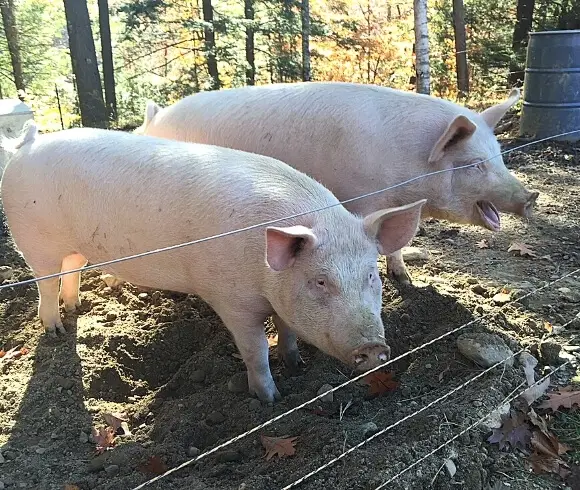
Keeping in mind, pigs diet needs to be varied from a wide source of food choices in order to create a balanced diet, feeding your pigs appropriately will keep them fat and happy for sure 🙂
WHAT YOU SHOULD NOT FEED PIGS
Just as important as knowing what can safely be fed to pigs, it may be more important to know exactly what cannot be fed safely to them.
Toxic food for pigs does not necessarily mean it will be fatal. Many of these foods can be toxic when eaten in quantity, or they may have no reaction whatsoever. Or they may just not like the food choice and will eat “around” it.
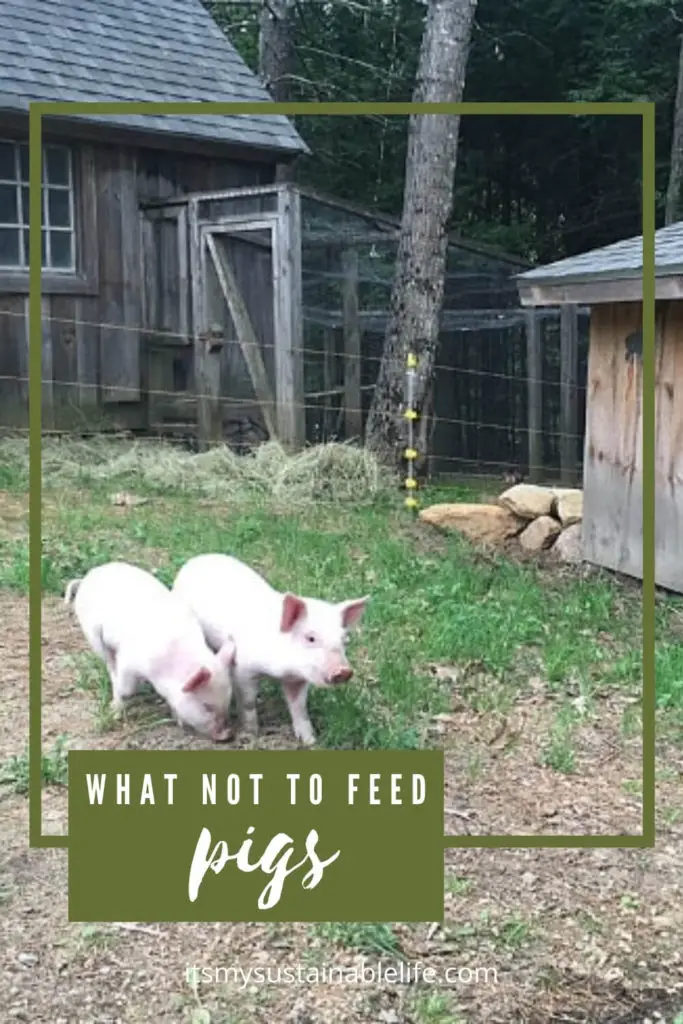
That being said, it’s good practice to never feed your pigs moldy, slimy, or rotten food.
Mostly pigs can eat, with a few exceptions, anything that humans can. With exceptions. The following list of foods that are not recommended for pigs, foods that pigs typically just don’t care for, and foods that can possibly lead to issues when consumed.
- Kale
- Animal Products Of Any Kind
- Avocado Skin and Pits
- Cherry Pits
- Chocolate
- Corn Stalks (high in nitrates)
- Nightshade Vegetables (eggplant, goji berries, peppers, tomatillo’s)
- Parsley
- Celery Tops
- Parsnip Greens, Uncooked & Unpeeled Parnsips
- White Potato
- Raw Cashews
- Tomato Leaves & Vines
- Unpitted Stone Fruits (can lodge in the intestines)
- Unshelled Walnuts (sharp shards of cracked shell can pierce the pharynx)
- Rhubarb
- Uncooked Sweet Potato
- Raw Meat
- Raw Eggs
- The Leaves, Vines, & Roots of Broccoli, Cabbage, & Turnip
- Processed Foods (does not offer proper nutrition and is not a healthy, caloric dense food source)
There is also varied advice on feeding pigs milk products. Some do, some don’t. I personally, have never supplemented milk into our pigs diet. But that may be because we don’t have a milking cow 😉
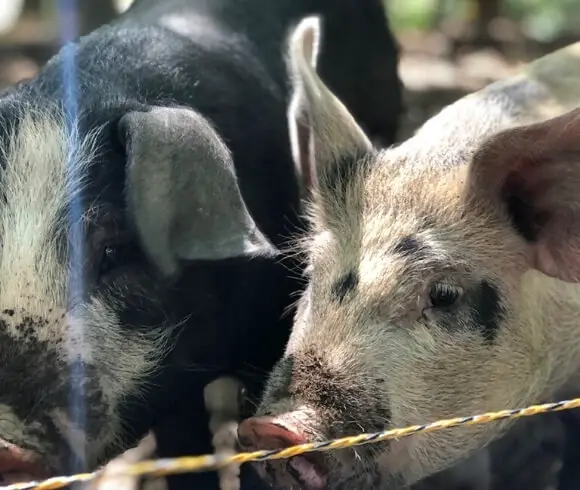
This list of what not to feed your pigs, should keep them not only fat and happy, but safe as well.
WHAT ELSE IS TOXIC TO PIGS
In addition to the above listed food items, there are other potential toxic risks that your pigs can be exposed to. Being aware of these toxins is the first step in prevention.
Should your swine be exposed to any of these toxins, I highly recommend having on hand some activated charcoal. Activated charcoal can assist in aiding absorption of any accidental ingestions and aid in keeping the animal protected from unwanted results of said ingestion.
Always consult with your veterinarian if activated charcoal is warranted when exposure happens.
Here are a few potential toxins to be aware of when it comes to our pig friends.
- Blue/Green Algae – Most often found in stagnant waters when temperatures are high. Ingestion of large amounts can lead to convulsions and death. Smaller amounts can cause weakness, staggering, jaundice, & constipation
- Lead Toxicity – You wouldn’t think this to be an issue today, however, with many older farms being utilized the possibility of exposure increases. Lead pipes, paint, and old machinery may have traces of lead still. A soil test is a wise choice for those located on old farmland prior to raising pig. High levels of exposure can present themselves as loss of appetite, incoordination, weakness, anemia, and even respiratory distress. If you think your pig was exposed to lead, consult with your veterinarian immediately.
- Pesticides, Herbicides, & Rodenticides – This may go without saying, but anything ending in “cides” as listed here is harmful, & can cause death and or serious illness. These are toxic chemicals and as such should be taken very seriously for the earth, yourself, and your livestock
- Blister Beetle Poisoning – BBP, aka Canthariasis, can be deadly to pigs. Blister Beetles have the unique defense system. Namely, Cantharidin, a toxic substance they can utilize against threats. Pigs ingest this toxic substance when eating alfalfa hay that has been infested with blister beetles. When feeding alfalfa hay, inspect closely. If you suspect your pig has BBP, contact your Vet immediately
- Mycotoxins – Mycotoxins are naturally occuring toxins produced by certain molds and are harmful to many of our farm friends. Pigs included. Should you live in warm, moist areas, this can be a real threat to your pigs. Keeping their area clean, dry, and using food that has been stored properly (using the oldest first) is a good practice, and never feeding food that has molded. Pigs being affected will display appetite & weight loss, slow growth, & respiratory issues
- Selenium – Selenium, a trace element, that can become toxic when taken in excessive amounts. Pigs can show signs of dullness, stiff joints, lameness, loss of hair from body or tail, and hoof deformities
- Salt – Pigs who have been water deprived or have ingested excessive amounts of salt, usually after heavy rains, can begin to show signs of salt poinsoning by wandering aimlessly, head pressing, blindness, slowly raising nose upwards and backwards, and falling on its side in spasms
These are just some of the hazards to be mindful of when raising your oinkers. No matter your level of experience when raising pigs, it’s helpful to keep a written checklist of what not to feed your pigs.
It may be helpful to talk with your local veterinarian about hazards specific to your area and add them to this list as well.
Learning to feed your pig a diet filled with a wide variety of healthy, nutritious fresh foods is sure to keep your pig happy and healthy. Learning what not to feed your pig allows you to be proactive in that quest.
What don’t you feed your pigs?
Love, Light, & Laughter ~

- How To Sanitize Seed Trays
- How Often To Water Tomato Plants
- Winter Sowing In Milk Jugs
- How To Appliqué
- What Food Group Are Eggs In
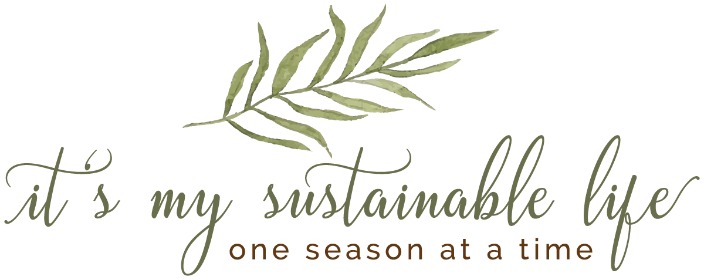
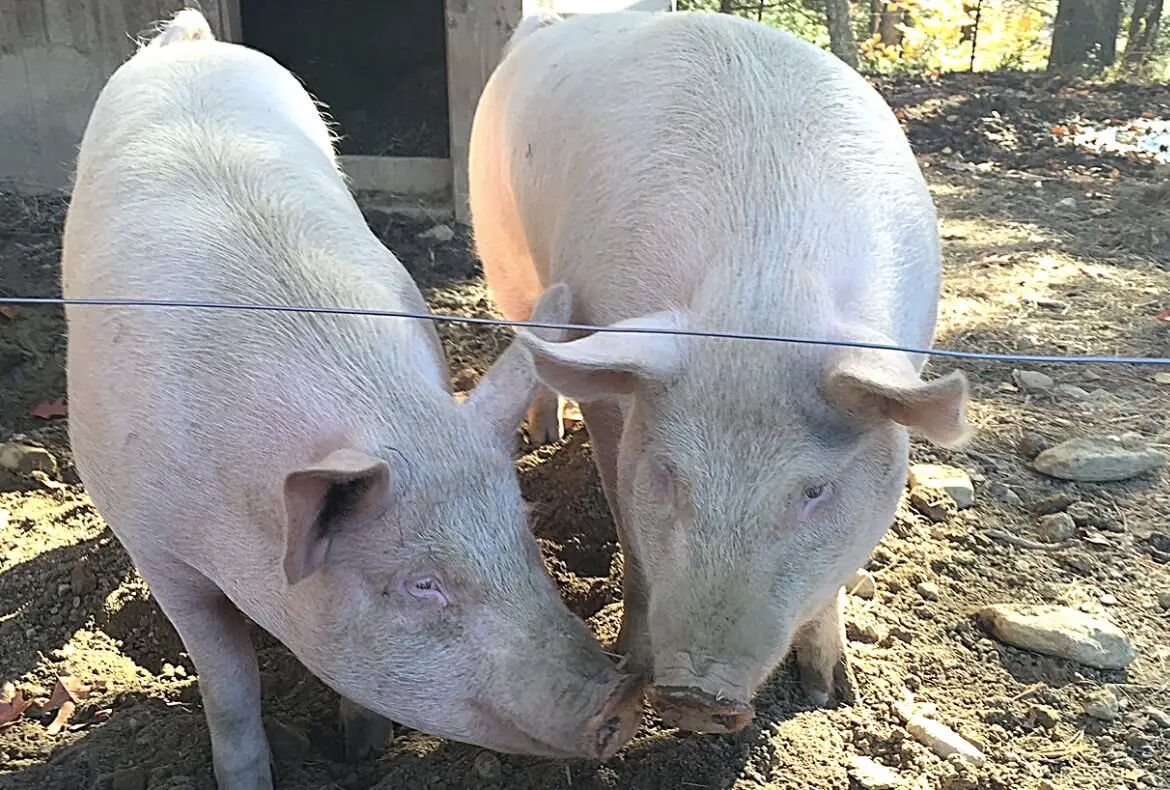

22 comments
I’ve heard that pigs are so smart! If I had one, it would be as a pet only. Unfortunately, I don’t have the space for one.
They are extremely intelligent & make wonderful pets. Thanks so much for reading, Cindy!
I was surprised by some of the foods on the “do not feed” list. For example, I would have thought that potatoes were fine.
Many discourage the feeding of raw potatoes due to their high startch content which is difficult for pigs to process easily in high quantity. They become easier to digest once cooked or dried for them. Thanks so much for stopping by!
Such a cool post for homesteading! We almost got a pig when I was young and I so wish that we had!
Such a list! WOW! I had no idea!
This made me think of the phrase “ you eat like a pig” but really pigs eat like humans.
I so want a pig, but I’m sure my dog just won’t have it LOL
Kale? How interesting! I wouldn’t have thought there would be an issue with it, or even celery tops. Thank you for sharing this important information!
Although kale & celery tops is not toxic to pigs, they typically just don’t like it. Thanks so much for stopping by!
Interesting info. I have always been told that pigs will eat anything. Which is why I do not eat them! lol
Very interesting information, while we’ll probably (albeit with my kids, I never know for sure) never had pigs but at least I have a resource to check if we ever did. Thank you!
Very interesting read! Being a city girl myself… and never having anything but domestic animals… its interesting to read about how different farm animals digestion works. I definitely got a giggle out of you referencing “oinkers” LOL.
It sounds to me that a proper pig diet should be much like a human. I probably eat worse than some pigs because I don’t take very good care of myself.
This was so informative. I am a city girl and have no idea about these things. Thanks for sharing.
I’ve heard that you can feed a pig anything…and that’s a little sad! I’m happy to hear you take good care of your pigs and fill them with good (better!) things!
I’ll have to keep this in mind if I ever acquire pigs! Love the pics of yours!
This is great info! I did think pigs could eat anything, but that isn’t true!
It would have never occurred to me that there were things that pigs couldn’t eat. Most surprisingly to me is raw eggs.
I had no idea so much went into feeding pigs! Interesting read.
I think a lot of people get confused about toxic food for animals. It may not kill them instantly but it is still not good to feed those things to them.
Good information. Some of the items on the do not eat list would have never occurred to me.